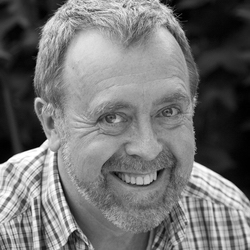There’s hardly a perfect show.
One part of acting is to present the character, it’s to present the play.
The other half of acting is to cover up all the mistakes that are going on.
So of course the audience never sees the same show twice, because there’s something else that goes wrong as opposed to what they saw.
We have this wonderful focus that it is the script that needs to come out, that’s what we’re trying to make big, make beautiful.
Entertain, make true. Things like that.
And this thing of the way… ”What does your character do?” Etcetera.
Because Polka was a puppetry based company and, indeed, it’s working with puppets. How do you direct a puppet?
It is like normal acting, but it is this character that is, say, doing the acting. Not the person, him or herself.
But the puppeteer is able to infuse that through the arm, through the fingers, beyond the fingers, into the creature, the object, that they are manipulating to be brutal.
And again, that’s a lovely skill, of making things come alive.
Making those things have thoughts, have emotions, have movements.
That’s awesome magic to create and perform.
And that goes hand in hand through the years of work at the theatre.
Robin Kingsland’s Sherlock Holmes involved time travel, and there was a girl protagonist as opposed to a boy protagonist.
Meeting up with Sherlock Holmes and Sherlock Holmes meeting up with Moriarty at Big Ben, off the dials at Big Ben and all over the place.
Nine major scenes are stages with no wings. Wow, how we were able to create such different spaces on that stage! “What can we do in this barn?”
And finding designers that have that sort of excitement.
And then production managers.
And indeed, how many production managers have I, sort of, pacified and they’ve walked away learning?
To be involved in all those different departments… Wardrobe is a joy.
The pride, the brilliance, the amazing work that comes out of that department is just beyond belief.
The costumes we have on our stage are gorgeous and it is Annie and Lennie…
They’re there, 1 a.m., 2 a.m., 3 a.m., etcetera.
And they come up with just masterpieces of costumes.
And I think Polka’s so friendly, so family orientated, so family friendly. Backstage as well as front of house.
I think that’s again how we have this wonderful atmosphere of creativity, without objects getting in the way, sort of thing. And that is such a lovely buzz.
So, it’s all fun. I love it.
I love sitting at 45 degrees, watching the actors but watching my audience as well. Seeing them taking in the show, thinking about it.
Watching and seeing, “Okay, the child is engrossed. No, the child has lost interest. Oh, that’s a shame. What have I done wrong here?”
Again, I’m saying the responsibility for understanding your audience range.
This being is learning. The respect you need to show is time.
Give the child that microsecond of extra time to take it on board, to then be able to put it aside and learn from it.
And with our material, yes, we feed it with something. It might take it in, take a breath to go, wait a few seconds, wait a minute, five minutes, there’s the answer.
And it’s developing that skill of listen and learn.
Listen and you will find out. Watch and you’ll find out.
